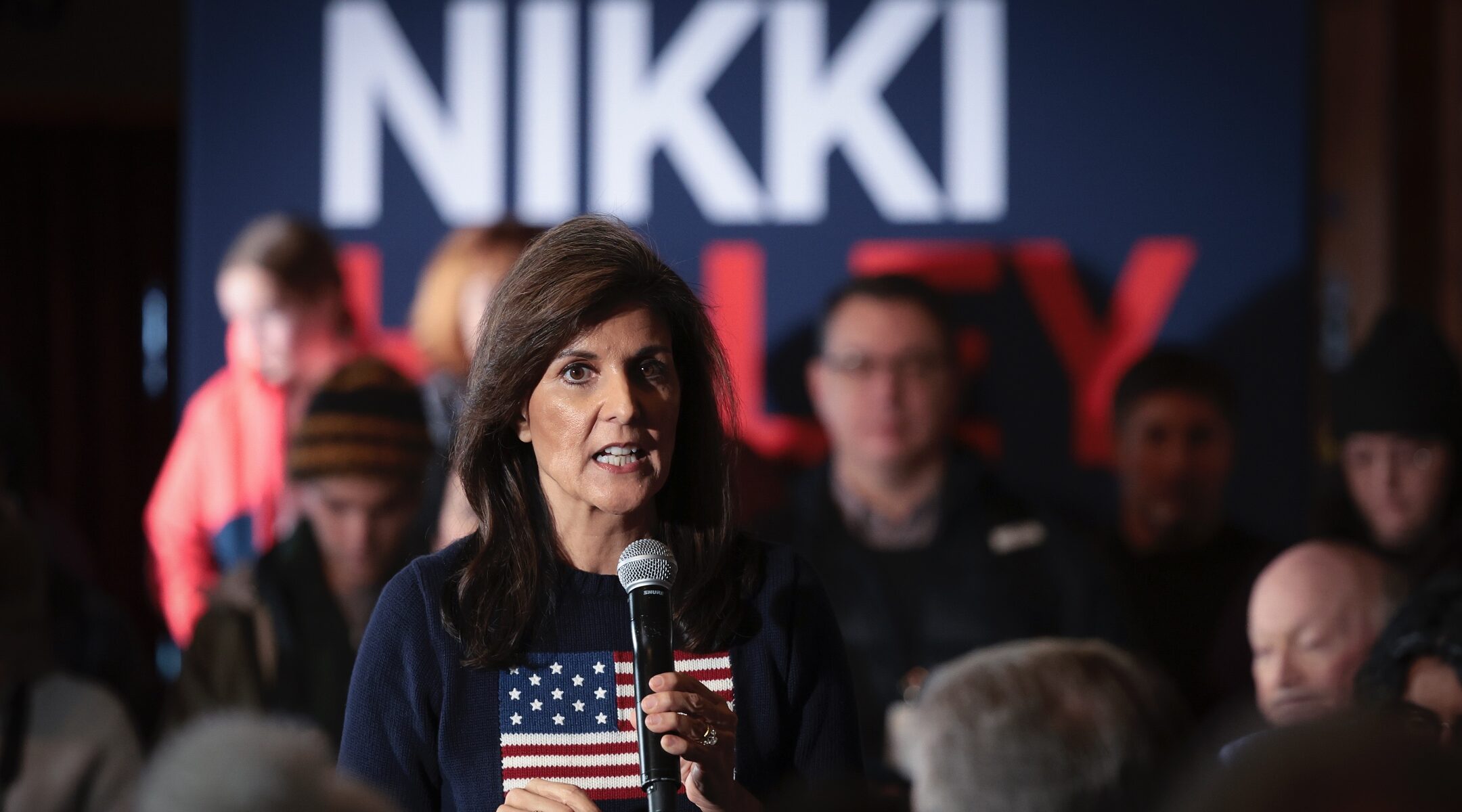WASHINGTON (JTA) — With just days to go until Republican voters begin casting their presidential primary ballots, Nikki Haley is hoping that she can pull off an unlikely win over Donald Trump.
One thing the former South Carolina governor has in her corner: a growing array of major Jewish donors.
Haley, who also served as Trump’s ambassador to the United Nations, is not yet leading in any poll. But she is creeping up steadily in national surveys, has reached a virtual tie for a distant second place and is hoping for an upset win in New Hampshire later this month, bolstered Wednesday when former New Jersey Gov. Chris Christie, who had been focusing on the state, dropped out. Eventually, she hopes to unite the entire anti-Trump vote behind her.
That anti-Trump constituency, according to one person with knowledge of how Republican donors are making decisions, includes many of the party’s most prominent Jewish names, who soured on Trump after the Jan. 6 riot at the U.S. Capitol and are tired of “the chaos and crazy” that accompanies the former president.
“The [Jewish Republican] establishment has been trying to figure out which horse is the best one to try and ride because they don’t want Trump as the nominee,” said the insider, who didn’t want to be named supporting a candidate. With Haley’s recent rise in the polls, he added, “they’re pulling their checkbooks out.”
According to Fred Zeidman, a Houston businessmen who is a leading fundraiser for Haley, Republican Jewish backers have gravitated to Haley because of her relatively moderate stance on abortion and her pro-Israel credentials.
“This woman absolutely, absolutely has been so staunchly pro-Israel,” Zeidman told the Jewish Telegraphic Agency.
“She really understands the politics, she understands what it means for the United States, what it means for world peace,” he said. “The other thing is, one of the biggest issues in the Jewish community is women’s rights. And she has been the first one to address [abortion] appropriately among the Republicans.”
Haley raised $24 million in the most recent quarter, more than double her haul in the previous round. And according to a recent Forbes article, the coalition of billionaires backing her is a who’s who of Jewish pro-Israel money.
Organizers of an upcoming Jan. 30 New York fundraiser for Haley, the magazine reported, include Cliff Asness, the hedge fund manager who took the lead in pulling a donation from his alma mater, the University of Pennsylvania, for its administration’s equivocation in condemning Hamas’ Oct. 7 invasion of Israel; Stanley Druckenmiller, a former hedge funder-turned-full-time philanthropist; Henry Kravis, an investor who has donated extensively to Israeli cultural endeavors; and Leonard Stern, the real estate magnate who has given heavily to Yeshiva University.
The next day, Haley will fly to Miami for another fundraiser, this one organized by Barry Sternlicht, a real estate billionaire who launched a $50 million pro-Israel initiative after Oct. 7, and Dan Och, a major giver to Birthright and the UJA-Federation of New York.
Haaretz reported last summer that Haley had garnered more support from the leadership of the establishment Republican Jewish Coalition than any other candidate. In recent months, as Trump’s lead in the Republican polls has solidified, her support from Jewish donors has soared even more.
She has the support of Jan Koum, the WhatsApp founder who has given $5 million to a super PAC affiliated with the candidate. Koum consults closely with the Jewish pro-Israel donor and GOP kingmaker, Miriam Adelson, who has pledged to remain neutral during this year’s primary. Asness has given $1 million to the same super PAC, the SFA Fund, and Stern has given $175,000.
Also said to be closing in on a decision to back Haley, said the person with knowledge of donors’ thinking, is Paul Singer, the influential Jewish hedge fund manager.
Other top Jewish donors to Haley’s super PAC include Ronald Simon, a California home builder whose family foundation runs a scholarship program for children from low-income families, who gave at least $1 million; Terry Kassel, a Palm Beach philanthropist who promotes Israel’s high-tech sector, who gave at least $250,000; and Elliott Badzin, a Minnesota car supply magnate, who gave at least $100,000.
The donors, often voluble when it comes to Israel and other hot-button political issues, are quiet when it comes to why they’re backing Haley: Asness declined to comment for this story and Kravis, Singer and Druckenmiller did not return requests for comment. A phone number for Koum’s family foundation reaches a law firm where a staffer said they have no way to reach Koum.
Haley gained legions of Republican Jewish fans when she made defending Israel the centerpiece of her 18-month stint at the U.N. She persuaded Trump to cut U.S. funds for UNRWA, the U.N. agency that aids Palestinian refugees and their descendants; she vetoed the appointment of Palestinians to high-ranking jobs; and she snubbed diplomats from nations who voted against Israel.
She debuted one of her trademark phrases, about how she wears heels as weapons, at an American Israel Public Affairs Conference in 2017.
“I wear high heels,” she said. “It’s not for a fashion statement, it’s because if I see something wrong I will kick it every single time.” (Years of deploying that phrase made her ready when another candidate, Vivek Ramaswamy, called her “Dick Cheney in heels” at a November debate. “They’re not for a fashion statement; they’re for ammunition,” Haley immediately rejoined.)
Israel has featured prominently in her campaign, especially since Hamas’ Oct. 7 invasion of Israel and the ensuing war. Before the war, she went after Ramaswamy’s proposal to cut defense assistance to Israel, saying at an August debate, “He wants to stop funding Israel. You don’t do that to your friends.”
She’s been hammering home the message on X, formerly Twitter. “Israel is a bright spot in a tough neighborhood,” she posted last week. “It has never [been] that Israel needs America. It has always been that America needs Israel.”
On abortion, Haley has tread a careful line: She has sought to embrace some of the most restrictive bans while not demonizing those on the other side of the issue. Unlike other candidates such as Florida Gov. Ron DeSantis, her rival for second place, Haley has said she will not seek a federal ban, leaving it up to the states.
“As much as I’m pro-life, I don’t judge anyone for being pro-choice, and I don’t want them to judge me for being pro-life,” Haley said at the November debate. “So when we’re looking at this, there’re some states that are going more on the pro-life side. I welcome that. There are some states that are going more on the pro-choice side. I wish that wasn’t the case, but the people decided.”
That stance is probably not going to swing any Jewish Democrats, but it stands out for moderate Jewish Republicans who know the party isn’t moving left on abortion anytime soon, but who want a Republican leader who will tamp down what has been, for the Jewish community, a painful culture war.
“The fact is that the Republican Party is a pro-life party and if you’re somebody in the Jewish community who, that’s your top issue, you’re not voting Republican, and that hasn’t changed,” said the Jewish Republican insider. But the insider called Haley the “tip of the spear in terms of the party and where it needs to be to have a more nuanced argument and a nuanced case on dealing with the abortion issue.”
Haley could still stumble: At a town hall in New Hampshire, she recently declined to mention slavery as a cause of the Civil War, widely viewed as a gaffe and as a sharp contrast to her decision in 2015 to remove the Confederate battle flag from the South Carolina statehouse after a white supremacist mass shooting at a Black church in Charleston. (The next day she said slavery was a cause.) She has a reputation for equivocating on an array of critical issues, including Trump’s role in the Jan. 6 riot.
And while Haley stood out for defending Israel at the U.N., it was Trump who made the decisions that substantially shifted U.S. policy to be more aligned with the Israeli right — moving the U.S. embassy to Jerusalem, pulling out of the Iran nuclear deal and recognizing Israeli sovereignty over the Golan Heights. Trump still boasts major pro-Israel backers, including his ambassador to Jerusalem, David Friedman.
But he also remains unpredictable, and the pro-Israel advisers who shaped his presidential policies, including his son-in-law Jared Kushner, are no longer actively advising him.
For months, Trump’s preferred target was DeSantis. But he is turning his rhetorical guns on Haley, a sign that he views her as a threat. In a recent email, he used an epithet that has been a disparaging code for wealthy Jews.
“Nikki Haley Is Funded By Democrats, Wall Street, & Globalists,” his email said.
JTA has documented Jewish history in real-time for over a century. Keep our journalism strong by joining us in supporting independent, award-winning reporting.






